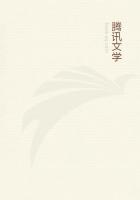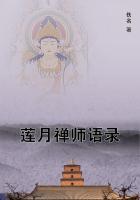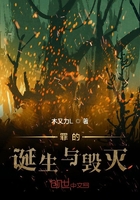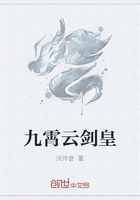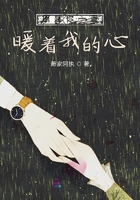And, after him, the Daucian twins were slain, Laris and Thymbrus, on the Latian plain;So wondrous like in feature, shape, and size, As caus'd an error in their parents' eyes-Grateful mistake! but soon the sword decides The nice distinction, and their fate divides:
For Thymbrus' head was lopp'd; and Laris' hand, Dismember'd, sought its owner on the strand:
The trembling fingers yet the fauchion strain, And threaten still th' intended stroke in vain.
Now, to renew the charge, th' Arcadians came:
Sight of such acts, and sense of honest shame, And grief, with anger mix'd, their minds inflame.
Then, with a casual blow was Rhoeteus slain, Who chanc'd, as Pallas threw, to cross the plain:
The flying spear was after Ilus sent;
But Rhoeteus happen'd on a death unmeant:
From Teuthras and from Tyres while he fled, The lance, athwart his body, laid him dead:
Roll'd from his chariot with a mortal wound, And intercepted fate, he spurn'd the ground.
As when, in summer, welcome winds arise, The watchful shepherd to the forest flies, And fires the midmost plants; contagion spreads, And catching flames infect the neighb'ring heads;Around the forest flies the furious blast, And all the leafy nation sinks at last, And Vulcan rides in triumph o'er the waste;The pastor, pleas'd with his dire victory, Beholds the satiate flames in sheets ascend the sky:
So Pallas' troops their scatter'd strength unite, And, pouring on their foes, their prince delight.
Halesus came, fierce with desire of blood;But first collected in his arms he stood:
Advancing then, he plied the spear so well, Ladon, Demodocus, and Pheres fell.
Around his head he toss'd his glitt'ring brand, And from Strymonius hew'd his better hand, Held up to guard his throat; then hurl'd a stone At Thoas' ample front, and pierc'd the bone:
It struck beneath the space of either eye;And blood, and mingled brains, together fly.
Deep skill'd in future fates, Halesus' sire Did with the youth to lonely groves retire:
But, when the father's mortal race was run, Dire destiny laid hold upon the son, And haul'd him to the war, to find, beneath Th' Evandrian spear, a memorable death.
Pallas th' encounter seeks, but, ere he throws, To Tuscan Tiber thus address'd his vows:
"O sacred stream, direct my flying dart, And give to pass the proud Halesus' heart!
His arms and spoils thy holy oak shall bear."Pleas'd with the bribe, the god receiv'd his pray'r:
For, while his shield protects a friend distress'd, The dart came driving on, and pierc'd his breast.
But Lausus, no small portion of the war, Permits not panic fear to reign too far, Caus'd by the death of so renown'd a knight;But by his own example cheers the fight.
Fierce Abas first he slew; Abas, the stay Of Trojan hopes, and hindrance of the day.
The Phrygian troops escap'd the Greeks in vain:
They, and their mix'd allies, now load the plain.
To the rude shock of war both armies came;Their leaders equal, and their strength the same.
The rear so press'd the front, they could not wield Their angry weapons, to dispute the field.
Here Pallas urges on, and Lausus there:
Of equal youth and beauty both appear, But both by fate forbid to breathe their native air.
Their congress in the field great Jove withstands:
Both doom'd to fall, but fall by greater hands.
Meantime Juturna warns the Daunian chief Of Lausus' danger, urging swift relief.
With his driv'n chariot he divides the crowd, And, ****** to his friends, thus calls aloud:
"Let none presume his needless aid to join;Retire, and clear the field; the fight is mine:
To this right hand is Pallas only due;
O were his father here, my just revenge to view!"From the forbidden space his men retir'd.
Pallas their awe, and his stern words, admir'd;Survey'd him o'er and o'er with wond'ring sight, Struck with his haughty mien, and tow'ring height.
Then to the king: "Your empty vaunts forbear;Success I hope, and fate I cannot fear;
Alive or dead, I shall deserve a name;
Jove is impartial, and to both the same."He said, and to the void advanc'd his pace:
Pale horror sate on each Arcadian face.
Then Turnus, from his chariot leaping light, Address'd himself on foot to single fight.
And, as a lion- when he spies from far A bull that seems to meditate the war, Bending his neck, and spurning back the sand-Runs roaring downward from his hilly stand:
Imagine eager Turnus not more slow, To rush from high on his unequal foe.
Young Pallas, when he saw the chief advance Within due distance of his flying lance, Prepares to charge him first, resolv'd to try If fortune would his want of force supply;And thus to Heav'n and Hercules address'd:
"Alcides, once on earth Evander's guest, His son adjures you by those holy rites, That hospitable board, those genial nights;Assist my great attempt to gain this prize, And let proud Turnus view, with dying eyes, His ravish'd spoils." 'T was heard, the vain request;Alcides mourn'd, and stifled sighs within his breast.
Then Jove, to soothe his sorrow, thus began:
"Short bounds of life are set to mortal man.
'T is virtue's work alone to stretch the narrow span.
So many sons of gods, in bloody fight, Around the walls of Troy, have lost the light:
My own Sarpedon fell beneath his foe;
Nor I, his mighty sire, could ward the blow.
Ev'n Turnus shortly shall resign his breath, And stands already on the verge of death."This said, the god permits the fatal fight, But from the Latian fields averts his sight.
Now with full force his spear young Pallas threw, And, having thrown, his shining fauchion drew The steel just graz'd along the shoulder joint, And mark'd it slightly with the glancing point, Fierce Turnus first to nearer distance drew, And pois'd his pointed spear, before he threw:
Then, as the winged weapon whizz'd along, "See now," said he, "whose arm is better strung."The spear kept on the fatal course, unstay'd By plates of ir'n, which o'er the shield were laid:
Thro' folded brass and tough bull hides it pass'd, His corslet pierc'd, and reach'd his heart at last.

